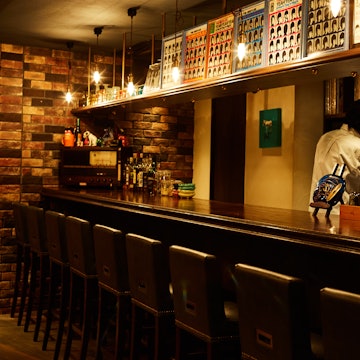
A taste of Chengdu – the capital of China’s mouthwatering Sichuan cuisine
Sponsored by
Aug 19, 2021 • 5 min read

Hot pot from Chengdu, the capital of Sichuan Cuisine.
Visitors to Chengdu definitely need to pack an appetite, as the city is a UNESCO City of Gastronomy. As the capital of Sichuan, there's no better place to experience the province's fiery, famed cuisine.
One of China's eight great cuisines, Sichuan food is characterized by the liberal use of chili pepper, star anise, and – most importantly – Sichuan pepper. The distinctive red peppercorns produce a tingling, numbing effect on the tongue and lips which complement the hot, invigorating chili mix. Together, they create the celebrated 'mala' (numbing, spicy) flavor that has made Sichuan cuisine famous worldwide.
In contrast with other spicy cuisines, the precise, balanced blending of spices in Sichuan food makes the experience of eating it more energizing rather than uncomfortable. For anyone nervous about ordering something too hot to handle, however, it pays to learn the key Mandarin phrase "辣不辣" or "là bù là?" while dining out in Chengdu. It translates to "spicy or not spicy?" and every waiter in every restaurant will use it to check your preferred level of heat, which the kitchen will adjust accordingly. Ordering "bù là," or not spicy, will usually produce a pleasantly potent dish rather than a completely spiceless version.
The cradle of Sichuan cuisine
In 2010, Chengdu became the world's second UNESCO City of Gastronomy (the first in Asia) to recognize its position as the epicenter of Sichuan cuisine. Well-known throughout history as a foodie city, Chengdu is the birthplace of culinary traditions and dishes that have come to represent Sichuan food. The city is a hub for the hospitality industry in the region, with chefs and restaurateurs creating ever-more innovative experiences for diners. While the range of quintessential Sichuan dishes on offer in Chengdu is vast, here are our picks for what to try when visiting the city.
Mapo Tofu
Mapo Tofu is one of Sichuan's most famous dishes – soft white bean curd swimming in a potent scarlet sauce of garlic, minced beef or pork, fermented soybean, chili oil, and Sichuan peppercorn. The contrast of the cooling, creamy tofu against the bubbling, oily sauce produces a subtle take on the mala flavor. “Mapo” literally translates to “pockmarked old woman,” and sometimes restaurants will list the dish as “pockmarked grandma's bean curd” on English menus!

Mapo tofu is the specialty dish at the upscale Chengdu institution Chén Mápó Dòufu on Xi Yulong Jie, where it is served in a burning-hot cast iron bowl. Non-spicy and vegetarian alternatives are also available. Luomashi metro station on line 4 is a few minutes' walk from the restaurant.
Dandan noodles
Dandan noodles are a classic Sichuan street food dish that has received international attention, appearing in various guises on menus worldwide. The original and best dandan noodles, however, are undoubtedly found in Chengdu. Freshly boiled, thin egg noodles are coated in a savory, smoky chili oil sauce and topped with anything you might be craving, from vegetables to minced pork to peanut flakes, depending on the vendor. For a dish with such simple ingredients, dandan noodles will electrify your taste buds.
Dōngchéng Dàndàn Tiánshuǐmiàn, an upmarket street-food joint not far from People's Park, is the place to try dandan noodles – locals pour in here to slurp up the flavorful bowls of noodle goodness.
Chaoshou dumplings
Sichuan's take on the humble dumpling comes slathered in a hot-and-sour spicy sauce, making chaoshou at once delicious and extra tricky to pick up! Usually filled with pork, chaoshou dumplings differ from other dumplings in China in that they are made with square, as opposed to round, pastry 'skins.' The skins are folded into two points, one crossed over the other. This folding technique gives the dumplings their name – chao shou literally translates as "folded hands" in Sichuan dialect.

Chaoshou dumplings with hongyou (red oil) sauce are a staple of the Chengdu snack scene and can be found in any neighborhood of the city.
Gongbao jiding
Originating in Sichuan and hugely popular around China, gongbao jiding is most well-known outside China as the original kung pao chicken. And there's no better place than Chengdu to try the authentic version of this internationally beloved dish.
Gongbao jiding appears on menus throughout the city, and while every restaurant does it differently, they all invariably use dried hot red chilies, Sichuan peppercorns, peanuts, and scallions. It's generally less spicy than other Sichuan dishes, and it is also one of China's few chicken dishes that uses boneless morsels of meat rather than the more common on-the-bone variety.
For a twist on a classic, high-end Mǎ Wàng Zi, on Dongkang Shijie, does a version that features aubergine and shrimp instead of chicken. The restaurant is not far from Chunxi Road metro station on line 2.
Fried rabbit with chilis
Unlike the rest of China, people in Chengdu are huge fans of rabbit. This lean, white meat is commonly stir-fried with chilis and peanuts and served with the bones still intact. Alternatively, rabbit can also be found roasted Sichuan barbeque style, with lashings of spicy marinade. A great place to sample rabbit barbeque is the Tang Song Food Street to the east of Tianfu Square – get there from Chunxi Road metro station.

Chengdu foodies believe in nose-to-tail eating and are particularly keen on consuming rabbit head. The whole rabbit skull is stewed in a richly flavored sauce of cinnamon, fennel, and chili before being served seasoned with sesame and more chili. Eaten in much the same way as crab and lobster, the skull is split open by the jaw to allow access to the soft meat in the cranial cavity. It's said that people will fly across China to eat rabbit head in Chengdu and Lao Ma Rabbit Head is a particularly popular place to sample it. Wenshu Monastery on line 1 is the nearest metro station.
Sponsored by Chengdu Tourism
As a travel entertainment and inspirational media outlet, we sometimes incorporate brand sponsors into our efforts. This activity is clearly labeled across our platforms.
This story was crafted collaboratively between Chengdu Tourism and Lonely Planet. Both parties provided research and curated content to produce this story. We disclose when information isn’t ours.
With sponsored content, both Lonely Planet and our brand partners have specific responsibilities:
-
Brand partner
Determines the concept, provides briefing, research material, and may provide feedback.
-
Lonely Planet
We provide expertise, firsthand insights, and verify with third-party sources when needed.












